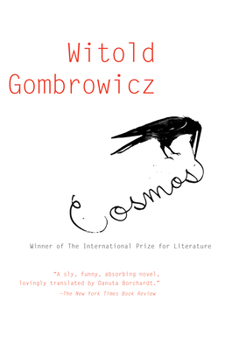Kosmos
Select Format
Select Condition 
Book Overview
Milan Kundera called Witold Gombrowicz "one of the great novelists of our century." His most famous novel, Cosmos , the recipient of the 1967 International Prize for Literature, is now available in a critically acclaimed translation, for the first time directly from the Polish, by the award-winning translator Danuta Borchardt. Cosmos is a metaphysical noir thriller narrated by Witold, a seedy, pathetic, and witty student, who is charming and appalling by turns. On his way to a relaxing vacation he meets the despondent Fuks. As they set off together for a family-run pension in the Carpathian Mountains they discover a dead bird hanging from a string. Is this a strange but meaningless occurrence or is it the beginning of a string of bizarre events? As the young men become embroiled in the Chekhovian travails of the family running the pension, Grombrowicz creates a gripping narrative where the reader questions who is sane and who is safe?
Format:Paperback
Language:English
ISBN:0802145620
ISBN13:9780802145628
Release Date:November 2011
Publisher:Grove Press
Length:208 Pages
Weight:0.40 lbs.
Dimensions:0.6" x 5.6" x 8.3"
Customer Reviews
1 rating
poetry, philosophy, psychology
Published by Thriftbooks.com User , 20 years ago
I read this book a few months ago ... but decided to write a few lines about it only now, after i finished Joseph Roth's "The Radetzky March". "Cosmos" can be considered a sequel in a sense to "The Radetzky March", even though the books have, on the surface, pretty much nothing in common."The Radetzky March" is written about the decline and fall of Austro-Hungarian empire, the whole pre-modern world, in fact, about emerging new men, who can not live by "simple" rules of their fathers.But the main character in "The Radetzky March", Carl von Trotta, is still "pre-modern", in a sense that his inner world is not developed to a degree of convoluted reflection, which is the main subject of "Cosmos".The protagonist of "Cosmos" is "super-modern", quintessentially modern ... not "post-modern", though. This highly poetic book is all about reflection, about a person observing an outside world through his own hidden impulses, vague desires and longings ... This outside world, "cosmos", is beautiful, complex, even convoluted, enticing, repulsive, dangerous ...Nobody is simple any more, each event has enigmatic second meaning - not to be fully comprehended ... ever. One more time: this is, probably, one of the most poetic books i ever read. It definitely deserves a second (third? fourth?) reading.





